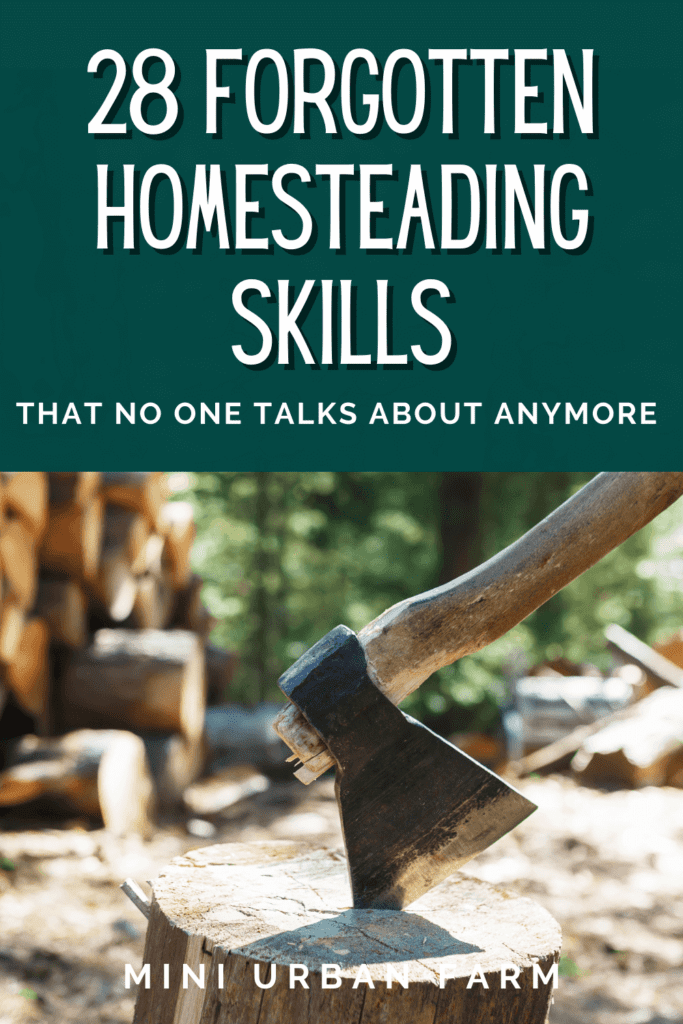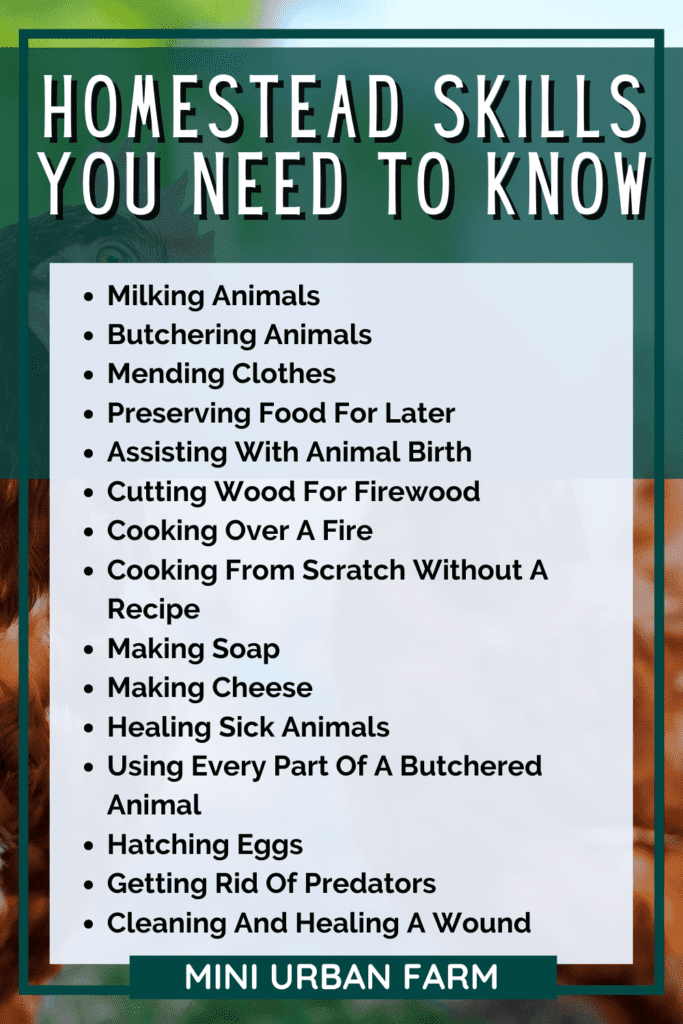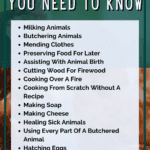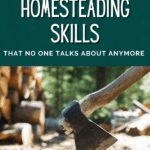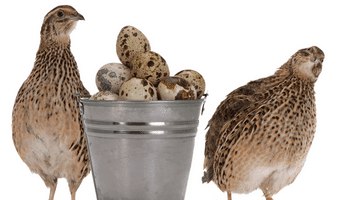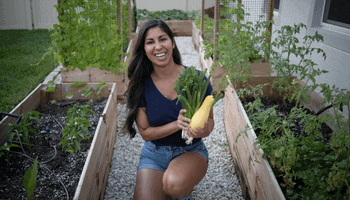As new homesteaders set up homesteads and turn to technology for assistance on their homesteads, many important skills have died away and go unused. However, as more people get into modern homesteading and turn to a simpler way of life, these forgotten homesteading skills have started to resurface and make their way back into daily life. And for good reason! These skills give modern homesteads a proven way to get things done and be self-sufficient.
28 Forgotten Homesteading Skills That All Homesteaders Should Know:
- Milking Animals
- Butchering Animals
- Mending Clothes
- Preserving Food For Later
- Assisting With Animal Birth
- Cutting Wood For Firewood
- Cooking Over A Fire
- Cooking From Scratch Without A Recipe
- Making Soap
- Making Cheese
- Healing Sick Animals
- Using Every Part Of A Butchered Animal
- Hatching Eggs
- Keeping Bees
- Knitting And Crocheting
- Building A Basic Structure
- Tanning A Hide
- Seed Saving
- Foraging For Food
- Sharpening Tools
- Bartering
- Organic Gardening
- Herbal Remedies
- Tapping Trees For Syrup
- Keeping A Budget
- Processing Wool Or Fur
- Getting Rid Of Predators
- Cleaning And Healing A Wound
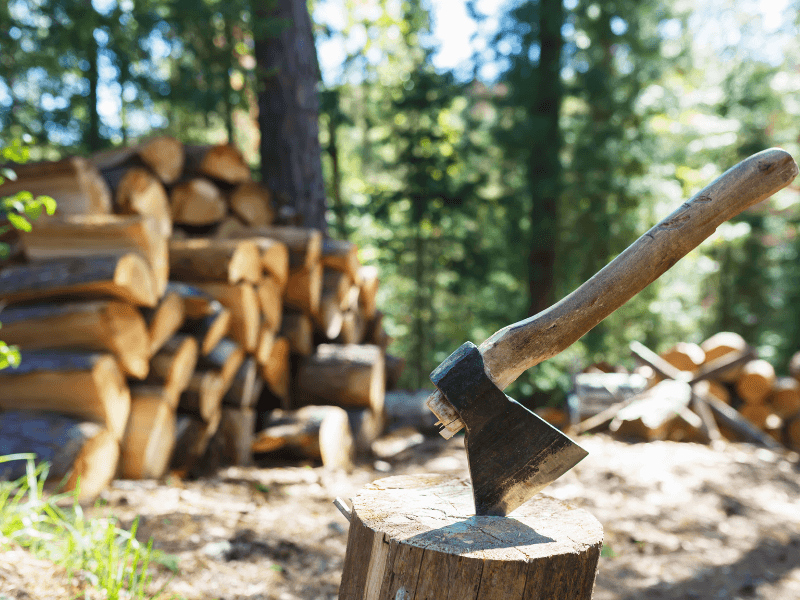
Disclosure: This post may contain affiliate links. If you purchase a product through one of our affiliate links we make a small commission from the sale at no extra cost to our readers.
FORGOTTEN HOMESTEADing SKILLS
It’s often easier to go buy milk at the grocery store than it is to keep livestock for your dairy needs. But what happens when the store runs out of milk?
Let’s say – um, you know – in the event of a global pandemic?
That’s when these skills come in handy!
So even if you don’t use them on a daily basis, each of these skills are an essential part of your homesteading knowledge!
Plus – watch this video on Ways to Homestead in the Suburbs for more!
1) MILKING ANIMALS
A huge part of homesteading is keeping livestock. Which includes dairy animals such as cows, goats, and sheep.
And while farmers “back in the day” used their hands to milk lots of modern homesteaders turn to technology (in the form of milking machines) to assist with this task.
And don’t get me wrong – I’m all for technology (queue Alexa letting me know the daily news), but having the basics of milking an animal is essential homesteading knowledge – whether or not you actually own dairy animals!
2) BUTCHERING ANIMALS
As someone who struggled with this for a long time, let me say I completely understand how terrifying this can be!
But if you’re going to keep animals on your homestead, then butchering just comes with the territory.
And even if you don’t raise animals for meat, you’re going to need to know how to put one down at some point – whether it’s sick, old and underperforming, or for any other reason.
Asking an experienced homesteader to help you learn this skill is a great way to start, since most are glad to show you the ropes.
My best tip is to start out with small animals such as quail, and then graduate to butchering bigger animals as you gain experience!
3) MENDING CLOTHES
In this era, it is embarrassing that most people don’t know how to mend clothes (in my humble opinion.)
They either take the clothing to a repair shop or discard them altogether and spend more money buying new clothes.
Something as simple as hemming pants or sewing on a button is a super easy skill to learn. And will save you tons of money down the road!
4) PRESERVING FOOD FOR LATER
Recently, most of the country experienced food shortages and the inability to actually buy food at the supermarket.
Which is just another reason why preserving food is an essential piece of homesteading knowledge that everyone should learn.
Whether it’s canning, dehydrating, freezing, or other methods of food preservation, every homesteader should learn this forgotten homesteading skill to make sure they never run out of food!
5) ASSISTING WITH ANIMAL BIRTH
I know a few different homesteading families who have had “emergency” births with their animals.
And sadly, there’s not always a vet around in the middle of the night to assist.
So learning how to assist with animal births (especially for the type of livestock you keep) is always a good idea!
This can be as easy as watching a few YouTube videos to prepare – or getting some hands on experience with another family nearby.
But either way, make sure you are prepared before breeding your animals!
6) CUTTING WOOD FOR FIREWOOD
Nowadays not many homesteaders use firewood for cooking their food and lighting their home – myself included.
And if they do, they often buy logs from local stores instead of cutting it themselves.
But learning how to cut firewood can not only save you money, it’s essential to learn so that you can stock up on wood, just like stocking up your pantry with food!
7) COOKING OVER A FIRE
Cooking over a fire has become almost non-existent for many homesteaders, with the rise of modern ways of smokeless cooking.
And I can honestly say I would much prefer to cook on my kitchen stove than over an open fire!
But as a homesteader, it is important to learn how to light a fire and cook on it – especially in the case of an emergency!
8) COOKING FROM SCRATCH WITHOUT A RECIPE
When we think of “cooking” today, we often think of buying premade jars of sauce from the grocery store, or following the instructions on the back of a box to make a pot of rice.
But cooking from scratch without a recipe seems to be a lost art – at least for a lot of people!
And don’t get me wrong – recipe books are great! I have tons of them on my kitchen countertop.
But what happens when you don’t have a specific ingredient? Or want to use up some left over ingredients before they go bad?
That’s where cooking without a recipe comes in!
And while this one may take some practice (and some not so great flavor combinations while you’re learning) it’s not too hard to learn the basics! This book on cooking basics is great to get you started!
9) MAKING SOAP
To be completely honest, this is one forgotten homesteading skill I haven’t ventured into yet.
And while I love buying homemade soaps at farmers markets, making my own seems daunting!
However, making your own soap is a great way to use fresh, natural ingredients and be sure of exactly what you’re putting on your skin.
Plus, it saves you money and is a great way to incorporate herbs and other products from your homestead!
10) MAKING CHEESE
Traditionally, nothing ever went to waste from the dairy milk that farmers got from their cows.
They would make yogurt and even cheeses for home consumption.
So if you have access to extra milk (as many of us raising dairy animals do), you can make cheese in a few very simple steps!
Plus, buying different cheeses at the store get expensive fast – and I don’t know about you, but in my house we eat a lot of cheese!
11) HEALING SICK ANIMALS
Treating sick animals at home is a skill that is lost to many people.
Dog has diarrhea? Call the vet.
Chickens laying soft-shelled eggs? Call the vet.
And while calling for a veterinarian is important in extreme cases, learning how to treat simple issues at home using over the counter medicines and natural remedies can save your animals’ life and save you vet bills!
12) USING EVERY PART OF A BUTCHERED ANIMAL
I will admit – the first time I butchered a chicken I threw away most of the inside parts and the bones.
Now, I would never think to do that!
Because if you’re going through the trouble of raising and butchering animals on your homestead, you might as well get the most use out of it.
So whatever type of livestock you keep for meat – learning how to use all the parts (from the guts to the hide) is a very useful homesteading skill!
13) HATCHING EGGS
Not all homesteaders hatch out their own eggs. And most homesteaders raising meat chickens will actually buy chicks from a hatchery.
But on our homestead, we’ve decided to hatch out our own chicks for meat. Which saves tons of money on the cost of chicks every year.
Now, hatching out chicks for meat is only possible if you’re using a dual-purpose chicken breed instead of the normal “meat chicken” hybrids.
But hatching out your own eggs is also useful when it comes time to replenish your egg layers, to sell chicks, or even to provide “incubation services” for others who don’t know how to hatch chicks!
14) KEEPING BEES
Beekeeping seems to be lost on most of us – especially when it’s so easy to get a cheap jar of honey from the store.
But keeping bees has so many other benefits! They help pollinate your garden for one!
And while getting set up with a beehive can be expensive, bees are an integral part of nature.
So why not give them a place to live on your homestead?
15) KNITTING AND CROCHETING
In the olden days, knitting and crocheting was a skill that every homesteader needed to have to make warm clothes, blankets, gloves, and scarves for their families – especially come wintertime.
That skill seems to have disappeared in many households and has been replaced by buying crocheted and knitted clothing from the store.
And yes, making your own gloves or scarves does take a fair bit of time. But there’s nothing like a homemade piece of winter clothing to keep you warm on cold days!
16) BUILDING A BASIC STRUCTURE
Unfortunately, building something from scratch is not as common as buying it from the store.
Not only is buying it pre-made more expensive, but when it inevitably breaks and needs to be repaired, those same people don’t have the skills to repair it!
This includes things like a basic shed, an animal shelter, or raised garden beds.
So having the know-how to build and repair these items will save you tons of money in the long run!
Of course, there are some skills you’ll need to have first – like using tools. But with some practice, these are easy skills to acquire!
17) TANNING A HIDE
When you butcher an animal, you get more than just the meat. And depending on the animal, you might get some leather to make other things you can use.
But before you can make leather items, you must learn the hide tanning process.
This one is on the more complicated side (I’m still in the learning process myself), but is a great skill to have in order to avoid wasting any part of the animal.
18) SEED SAVING
Did you know that you can skip buying seeds every season?
It’s as simple as saving your seeds from existing crops!
So at the end of every gardening season, I make sure to save the seeds of anything I plan on growing again. Often these seeds will last for a few years, which gives me plenty of seeds for the upcoming season!
This is by far one of my favorite ways to garden on a budget and I even have seeds to share with friends and family!
19) FORAGING FOR FOOD
A lot of people have no idea what foraging is.
But chances are if you’re into homesteading you’ve probably heard about it before, even if you’ve never tried it yourself.
Foraging for food has been a thing since the dawn of time, but the current generation does not often turn to foraging for food as a good resource.
I personally think it’s partly due to the “it must be FDA approved” mentality that many people have.
But you can find so many edible plants around you if you just look! Things like mushrooms, wild fruits, and herbs often grow undisturbed in the woods, on river banks, and other forgotten places.
However, if you’re going to go foraging for food you should definitely brush up on your wild plant knowledge ahead of time – and especially before putting anything in your mouth!
20) SHARPENING TOOLS
There’s nothing worse than a dull knife!
Especially when it comes to butchering animals or performing other homesteading tasks.
But instead of just replacing your knife or other tool, learning to sharpen them can make a huge difference!
Plus, you can get a sharpening stone super cheap! I use this one to sharpen my butchering knives and it’s worked out great so far!
21) BARTERING
Bartering seems like such a foreign concept if you live in an urban setting.
You wouldn’t think to go into Home Depot and offer a lower price for that lawn mower.
But bartering does have a place in modern homesteading, specifically if you shop at local stores or farmers markets!
And there are so many places online you can barter with your neighbors. For example, I’m part of a few homesteading groups on Facebook where people will trade seeds or plant starts.
And never discount the power of bartering and negotiating – even at big box stores. You might be surprised!
22) ORGANIC GARDENING
When I first started gardening, I used pesticides and other non-organic fertilizers to keep pests away and keep my plants healthy.
But after a while it seemed pointless to use these things, when the whole point of growing my own food was to avoid chemicals!
And I completely understand that organic gardening takes work! Trust me, I get it.
There’s definitely a learning curve – and the desire to just add some Miracle Grow is real!
But if you can pick up some organic gardening tips and tricks, you’ll definitely be better off in the long run!
23) HERBAL REMEDIES
Have a headache? Take an Advil.
Toothache? Oragel.
Nausea? Dramamine.
With so many over the counter remedies, it might be easy just to “pop a pill” and be immediately cured.
But many of us modern homesteaders are already growing tons of medicinal plants – might as well make good use out of them!
For example, did you know that rosemary is high in antioxidants and can protect your body from certain chronic diseases? Or that basil can help you avoid a cold?
24) TAPPING TREES FOR SYRUP
One of my long term goals is learning how to make my own maple syrup. And of course, that involves learning how to tap a tree.
Because nothing screams “homesteading” more than a homemade bottle of syrup over homemade pancakes!
Trees such as Maple, Birch and Sycamore can be tapped to make syrup – and while it’s definitely a process, how awesome would it be to go out onto your homestead a tap a tree?!
25) KEEPING A BUDGET
Personally, I’ve always kept a budget.
Every two weeks (on pay day) I sit down and pay my upcoming bills, calculate where the money is going, and make sure every penny is accounted for.
However, I’ve recently learned that that’s not the norm.
Keeping a budget is not only one of the simplest forgotten homesteading skills – but it’s a skill that helps you control your money!
For example, one of my friends recently told me she has no idea how much money she spends on food every month. No wonder she has almost no savings!
26) PROCESSING WOOL OR FUR
Wool shearing and harvesting was a homesteading skill that old-time homesteaders needed to learn in order to stay warm.
But if you’re a modern homesteader, you’ve probably never considered learning this skill.
And why would you when yarn is so cheap?
But learning to process wool and fur can be very lucrative! And lots of people who knit or crochet will pay a premium price for good quality materials!
27) GETTING RID OF PREDATORS
There’s nothing like going out to your chicken coop to find your birds missing!
So if you keep livestock, learning how to get rid of predators is essential.
This can include setting traps to catch predators, warding off predators with livestock guardian dogs, or even building better structures to protect your animals.
28) CLEANING AND HEALING A WOUND
It’s not likely that you’ll have to heal a huge gash in your abdomen on a regular basis. But on the off chance that anything does happen, you should be able to clean and heal a small wound without having to run to the emergency room!
Of course, this one will depend on how bad the wound is. So use your best judgement, but if you can learn this important skill, you’ll be able to save yourself time and headaches!
Learning these 28 forgotten homesteading skills will have you well on your way to a sustainable homesteading lifestyle! Not only will these skills save you money, they will also ensure that you’re prepared in case of an emergency!
PIN FORGOTTEN HOMESTEADing SKILLS!
